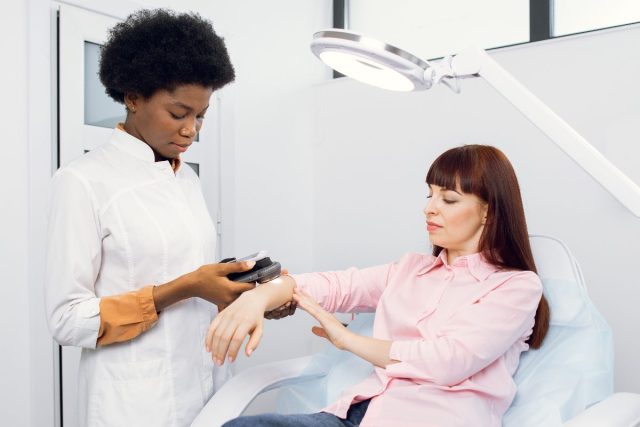Taking Vitamin D Supplements Regularly May Reduce Your Skin Cancer Risk, Study Says

It’s thought that one out of every five people in the United States will face skin cancer, according to the American Academy of Dermatology Association. It’s also the most common cancer in the U.S., with over one million people in the country specifically dealing with melanoma. Although you can reduce your risk of skin cancer by limiting how much time you spend in the direct sun, using sunscreen, and keeping an eye out for signs of cancer, a new study has found that you might also be able to ward off skin cancer with the help of vitamin D supplements.
The study, which was published by Melanoma Research, involved 498 adults between the ages of 21 and 79 years old: 245 were women, 253 were male, and 96 participants were immunosuppression. According to the study, it was believed that all participants were at risk of developing skin cancer.
Participants were put into one of three groups based on how often they reported taking vitamin D supplements. While 99 people said they never took the supplements, 126 said they occasionally took them, and 177 said they used the supplements regularly.
Researchers’ findings show that those who used vitamin D supplements occasionally had a 46% less chance of being diagnosed with malignant melanoma. For regular users, this number went up to 55%. Beyond that, these numbers correlated to similar numbers for other types of skin cancer.
While that sounds promising, senior author of the study Ilkka T. Harvima, MD, Ph.D., Department of Dermatology, University of Eastern Finland and Kuopio University Hospital explained in a statement via Medscape Medical News that although certain variables were considered and accounted for, “it is still possible that some other, yet unidentified or untested, factors can still confound the present result.” Because of that, “the causal link between vitamin D and melanoma cannot be confirmed by the present results,” Dr. Harvima’s statement continued.

Dr. Slade Stratton, a dermatologist and professor in the division of dermatology at Washington University School of Medicine in St. Louis, also warns against taking too many vitamin D supplements.
“This is a retrospective uncontrolled study, and it is difficult to draw any conclusions about vitamin D and whether or not it might help prevent melanoma,” Dr. Stratton tells Eat This, Not That! “All we can say is that the Finnish study subjects that regularly took a vitamin D supplement seemed to have slightly less melanomas, but we don’t know why.”
“It may very well be from some other factor shared by that group, i.e., Finns that take a vitamin D supplement regularly, may also avoid sun exposure more than Finns who do not take a supplement,” Stratton adds. “We just can’t tell what vitamin D’s actual role in the lower melanoma incidence is from this kind of study.”
“The data is very conflicted on whether vitamin D prevents skin cancer,” Stratton notes. “Lab studies have shown that vitamin D3 protects skin cells against ultraviolet-induced damage, but how it might actually be protective in the body is still a topic of study.”
At the same time, Stratton is sure to point out, “We may know more about vitamin D and its possible role in preventing progression of melanoma from a long-running trial set to complete late in 2023. It will be exciting.”
If you’re still interested in trying vitamin D supplements, Johna Burdeos, RD, suggests that you do your due diligence researching your choice supplement brand or manufacturer before purchasing and taking vitamin D or any other supplements they may provide.
“As with any dietary supplement, consumers should understand that the supplement industry is not tightly regulated the way that medicine and food are,” explains Burdeos. “As such, consumers should not blindly select a vitamin D supplement and should research the supplement.”
“Find out if it’s gone through independent third-party testing such as with US Pharmacopeia, NSF, or ConsumerLabs,” Burdeos says. “These third parties have no affiliation such as production and marketing with a company. They check to see if the contents in the product match what is stated on the label and for purity—ensuring there are no contaminants or ingredients that may pose a risk.”
“It is always a good idea to speak to your doctor first, if you’re considering supplementation or wondering if you need one in the first place,” adds Burdeos. “Some medications may interact with vitamin D, [so] chatting with your doctor would help.”
“Be wary of supplements that make bold promises or ‘too-good-to-be-true’ sounding claims,” Burdeos advises. “Lastly, always follow the directions on the bottle.”
- Source: https://www.aad.org/media/stats-skin-cancer
- Source: https://journals.lww.com/melanomaresearch/Abstract/9900/Regular_use_of_vitamin_D_supplement_is_associated.51.aspx
- Source: https://www.medscape.com/viewarticle/986867
- Source: https://clinicaltrials.gov/ct2/show/NCT01748448?term=vitamin+d&cond=melanoma&draw=2&rank=1









